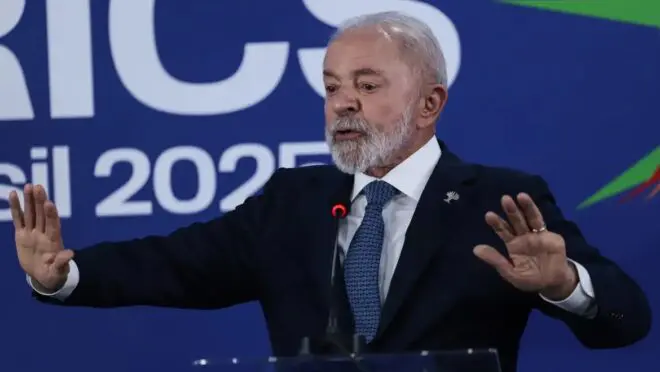
During a press conference on Monday, 7, after the BRICS summit in Rio de Janeiro, President Luiz Inacio Lula da Silva (PT) said that the replacement of the dollar with local coins in international trade among the bloc countries is an irreversible process. “It’s something that has no return,” said the president, according to information published by the newspaper Economic value.
Lula reiterated that decalarization will occur gradually and defended changes in the functioning of international financial institutions, including the International Monetary Fund (IMF). According to the Brazilian president, the dollar hegemony in the global system is the result of a historically built model that needs to be reviewed by developing countries.
The statement was made at the end of the Brics State Heads Meeting, a group formed by Brazil, Russia, India, China and South Africa, which met in the state capital to discuss economic, financial and geopolitical guidelines. The meeting agenda included topics such as strengthening trade between member countries, institutional reforms and the creation of alternative mechanisms to western powers dominated.
Criticism of the international financial system
During his speech, Lula criticized the unequal distribution of power within multilateral organisms. He pointed out that although the Brics countries represent about half of the global Gross Domestic Product (GDP), the group has only 18% of voting power in the IMF.
“It’s an inconsistency that needs to be faced,” said the president. According to him, this disproportion reinforces the need to seek alternatives to the current international economic governance structure, now centered on developed countries.
Lula also mentioned the possibility of the block advancing in the development of own payment systems and the use of national currencies as a reference in business transactions. The proposal, according to the president, is already under discussion among the member countries and should be deepened in the next meetings.
Russia’s support to the Brazilian proposal
The president of Russia, Vladimir Putin, participated in the summit for video conferencing and supported the Brazilian proposal. In his intervention, Putin said that the use of local coins in trade between BRIC members can represent a strategic advance for the group.
The Russian President’s speech reinforces the ongoing articulation in the bloc to expand the financial autonomy of emerging countries, reducing the dependence of the international system based on the dollar and mechanisms such as SWIFT, a network of controlled bank transactions mostly by Western countries.
Tension with the United States
The BRICS initiative takes place amid reactions from countries such as the United States. Former US President Donald Trump, a possible candidate in the upcoming presidential elections, threatened to impose a 10% rate on products from countries that formally support the group’s agenda.
Lula minimized the statement, stating that the theme “had no relevance” in the discussions of the summit. According to him, the focus of the meeting was the expansion of cooperation between the BRICS countries and the creation of viable alternatives for the strengthening of intra-blacco trade.
The possibility of adopting commercial tariffs by the United States was not included in the final statement of the summit, and representatives from other countries have avoided commenting on the theme publicly.
Expansion of BRICS and new members
Another point addressed by Lula was the will of the group to expand its composition. “The block is open to expansion,” said the president. The inclusion of new members is under evaluation and should consider economic, geographical and strategic criteria.
Since last year, countries such as Argentina, Iran, Saudi Arabia, Egypt and Ethiopia have expressed interest in joining the group. The eventual expansion is seen by analysts as a way to reinforce the joint action of developing countries in the international scenario.
Alternative system to swift and next steps
BRICS advancement in building an international payment system is part of a medium and long term plan. The idea is to create mechanisms that allow transactions between the groups of the group without the need to pass through institutions controlled by nations outside the bloc.
The alternative SWIFT system is being discussed in parallel to the expansion of the use of national currencies in bilateral trade agreements. Countries such as China and India have already implemented pilot experiences in this regard, with transactions carried out in Yuan and Rupia.
For experts, the consolidation of a decentralized model of payments will depend on technical and political agreements, as well as investments in financial and digital infrastructure. The proposal, however, has increasing support among BRICS members.
Implications for global trade
The explicit defense of Lula’s disbelief marks a new moment in Brazil’s international performance. By placing the theme as a priority on the BRICS agenda, the Brazilian government signals alignment with the strategy of emerging countries to seek greater autonomy in economic and financial decisions.
Although the transition should not occur immediately, the movement of the block indicates a scenario of changes in the structure of international trade. The role of the dollar as a predominant currency in transactions between countries can be gradually replaced by regional agreements based on local currencies.
The consolidation of this process will depend on factors such as macroeconomic stability, legal certainty and multilateral agreements that support the new logic of functioning of the global market. The Rio de Janeiro summit, according to observers, reinforced BRICS’s commitment to this goal.
Source: https://www.ocafezinho.com/2025/07/08/lula-declara-que-fim-do-dolar-no-comercio-entre-paises-do-brics-nao-tem-volta-e-defende-uso-de-moedas-locais/

